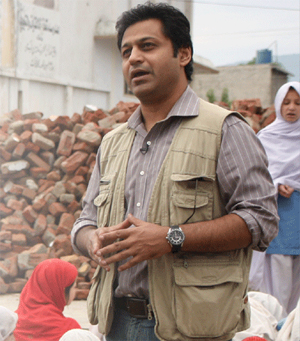
Written by: Fahd Husain
Posted on: March 30, 2013 |  | 中文
| 中文
The last decade has seen an unprecedented growth in the media industry in Pakistan. Today it has become a powerful actor and is playing the role of a watchdog keeping an eye on the pillars of the State.
This explosive growth has been mainly concentrated within the electronic media. Till 2001, television in Pakistan was solely owned by the government. The dissemination of news and information was the prerogative of the State broadcaster, Pakistan Television (PTV). Pakistani viewers had little or no access to independent news sources, with the possible exception of newspapers that were privately owned and reported independently; but their reach was significantly less than that of television.
The Musharraf government opened up the Pakistani airwaves after coming to power and the first privately-owned and operated TV channel was launched in 2002. Since then, there has been a mushrooming of channels, with almost all major media houses and newspaper owners establishing their own TV outlets. The genres of channels include news, entertainment, music, sports, cooking and even health.
 |
| Fahd Husain |
But the news and current affairs channels have had the most profound impact on national politics. With round-the-clock news, views and analysis beaming into millions of homes, Pakistanis are now bombarded with information every minute of every day. This constant flow of information has had a tremendous impact on increasing awareness among the population and has provided them the opportunity to hear every point of view. It has also brought governments under scrutiny as live broadcasts relay information across the country and expose official shortcomings, blunders and excesses without fear or favour.
The result is a much more transparent system where anything and everything is open to question and scrutiny. Media competition over attracting a larger viewership has led to the pursuit of increased accountability of politicians, as well as state institutions, who are answerable to the public for all doings.
Since coming into its own, the media has played a key role in shaping major events. One such example is the lawyers’ movement of 2007 which ultimately led to the ouster of President Pervez Musharraf. It was the media’s blanket coverage of the movement that transformed it into a political force and piled pressure on a regime which appeared indestructible. The lawyers came out on the streets when Musharraf removed the Chief Justice of the Supreme Court, and it was the media which strengthened this movement by showing live images across millions of homes.
A majority of Pakistanis now get their news from television. In many ways, politicians now prefer to come and speak on TV rather than deliver speeches in the parliament or political rallies. In fact, TV has become the strongest opinion-forming platform and political parties and state institutions have realized that it is through this medium that they must build perceptions and market their performance. As a consequence, political stakeholders have been forced to adjust to an age where they are increasingly becoming answerable to the public. Media, it seems, is now driving the national agenda.
In every respect, the rise of a strong media is a healthy development for Pakistan. It has strengthened civil society, held traditional power centers accountable, has given voice to the silent majority and reined in any excesses of the State. The media has brought a certain equilibrium to a society which was traditionally skewed heavily in favour of the elite. It has altered national discourse in favour of the common Pakistani and directed the State’s attention to the needs and compulsions of the common man on the street.
Through the rise of the independent media, we are seeing the contours of a new and evolving society demanding greater transparency and a level playing field for all, regardless of their official status. It may take a while to achieve this, but the journey, it seems, has begun. The media is the engine that is forcing this welcome change in Pakistan.
You may also like: